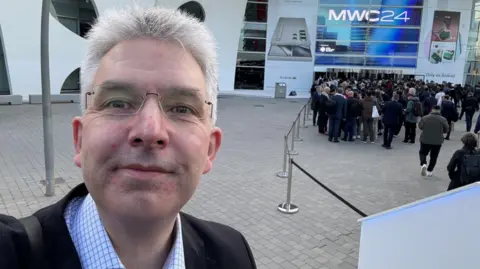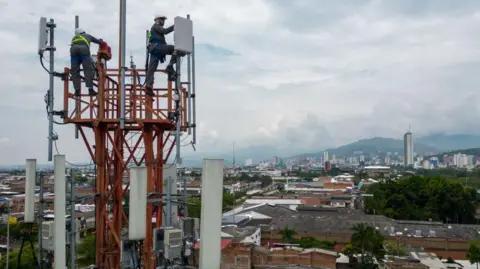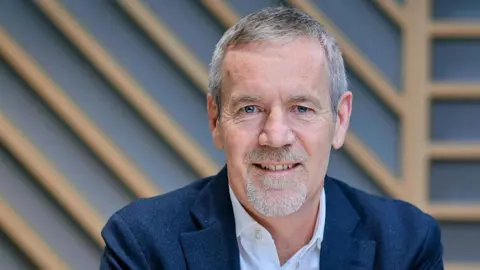Our mobile phones are getting a whole lot smarter, but what about the telecoms networks they run on?
Last week, Apple became the latest mobile phone firm to announce that it will be adding artificial intelligence (AI) to its handsets’ operating system.
Called Apple Intelligence, and also due to be incorporated into the phones’ Siri chatbot, it aims to make them easier and quicker to use. And turn Siri into even more of a personal assistant.
It follows after Samsung’s Galaxy AI, and Google’s Gemini AI for its own Pixel handsets.
This increased of use AI means phones will be doing a lot more computing, and that means they’ll produce and use a lot more data. This is going to put more strain on the mobile phone networks, such as the UK’s O2, EE, Vodafone and Three.
To help them cope, telecoms firms such as these are also increasingly introducing AI, says Ian Fogg, director of network innovation at research consultancy CCS Insight.
“Network operators are using AI to manage the radio frequencies dynamically, to provide an optimum level of service. And to manage cell towers, for example, so they use less energy at times of lower demand."
Such increased use of AI to look after mobile phone networks is now very much global. In South Korea, Korea Telecom is now able to localise and fix faults within a minute, thanks to AI-enabled network monitoring, says Alex Sinclair, chief technology officer of the GSMA, the body representing global mobile operators.
Meanwhile, AT&T in the US is using predictive, AI algorithms schooled on trillions of previous network alerts to warn it when things are about to go wrong.
 Ian Fogg
Ian FoggOther operators, like Vodafone, are using AI digital twins - virtual digital replicas of real-world equipment, such as masts and antennas – to constantly monitor how their networks are performing.
And AI is also being used to manage how increasingly massive data centres use energy to keep their servers cool and optimise storage capacity.
The explosion in data created by the increased use of AI is another reason why telecoms firms around the world are continuing to invest in so-called 5G Standalone mobile networks. These use new, dedicated 5G infrastructure rather than relying in part on upgrading the older, less efficient 4G system.
5G Standalone offers much higher speeds and capacity. But some experts believe that even this higher-spec technology won’t be sufficient to cope with the demands of the AI era.
At this year’s Mobile World Congress in Barcelona, for example, some experts argued that AI won’t be able to reach its full potential until the roll out of 6G from 2028.
While mobile customers only tend to notice the network when things go wrong, they are much more aware when customer service levels are poor, with all the reputational damage this can cause brands.
So the industry is also hoping AI can radically improve the way they interact with and serve customers.
For example, the Global Telco AI Alliance - a joint venture company made up of Deutsche Telekom, e&, Singtel, Softbank and SK Telecom with 1.3 billion customers across 50 countries – aims to develop an AI chatbot specifically tailored to the telecoms sector, and the type of questions customers typically ask.
This specially trained chatbot will be able to deal with most of the basic queries coming from customers, leaving call centre staff free to concentrate on more complex cases, the Alliance’s founders hope.
 Getty Images
Getty ImagesMeanwhile, Vodafone has teamed up with Microsoft’s Azure OpenAI Service to improve its customer service, spearheaded by its digital assistant Tobi, which interacts with more than 40 million customers a month in 13 countries and across 15 languages.
The more Tobi can answer customer queries without the need for human intervention, the fewer complaints there are likely to be, which is good for profits and corporate reputation.
“We see AI primarily as a ‘virtual assistant’ for humans,” says Scott Petty, Vodafone’s chief technology officer. “We already see AI freeing-up Vodafone employees’ time from tedious, repetitive manual work, enabling them to focus on more creative activities that benefit our customers and the environment.”
AI also leaves the customer agents freer to work on more complex cases, he argues. Vodafone also says that Azure OpenAI is helping customers more easily find what they’re looking for on its websites, with early evidence showing a doubling in the number of successful completed online customer journeys, and a 10% reduction in follow-up calls.
 Vodafone
VodafoneWhile many commentators worry that AI could lead to massive job losses in the telco sector, as menial tasks are increasingly automated by software, GSMA’s Mr Sinclair believes it could actually be empowering, particularly for lower-income countries.
“AI will give emerging markets a specialist tool to help them catch up,” he argues. “We’re in favour of trying to democratise AI so that it’s not just the wealthy who can use it.”
He believes that some of the doom-mongering around AI has been overdone, and so he strikes a more optimistic tone.
It’s a view shared by CCS Insight’s Ian Fogg: “AI has been around for some years, used for specific [telecoms] cases. But now it’s being applied in many more areas - network, devices, software - such that every tool we use now has the potential to become much, much better.
“AI has the potential to make networks greener, and the world a more efficient place.”


Post a Comment